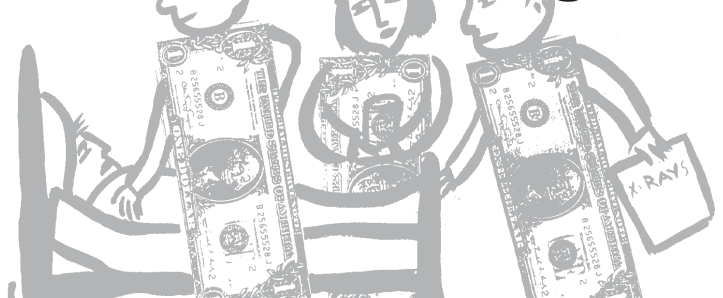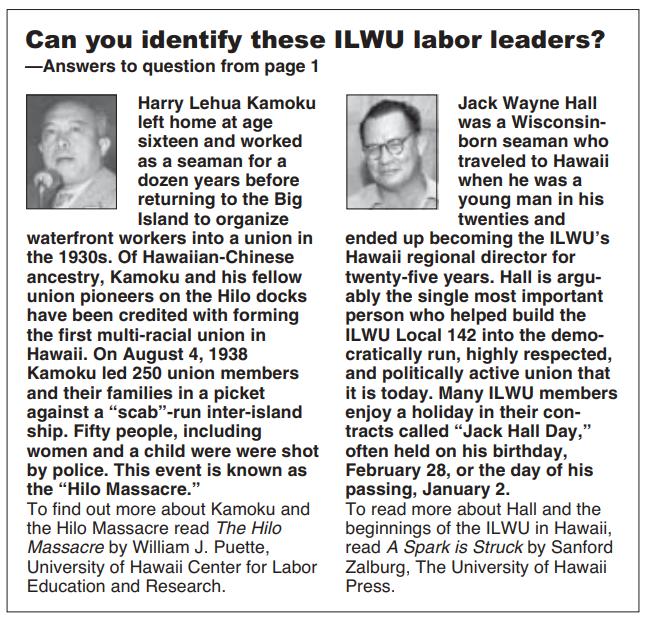Presently, ILWU contracts require each hotel to provide medical and dental plans for qualified full-time and part-time employees and their dependents. This means that each hotel must purchase these plans from HMSA, Kaiser, or one of the other insurance providers.
The biggest problem with this kind of health coverage is that the union and the hotels have no control over the increasing cost of the plan. Small hotels don’t have the buying power to get a good deal from HMSA and often end up paying more for their medical plans. Other ILWU hotels are paying very high premiums because of heavy medical usage or a few major illnesses.
All ILWU hotels are now faced with continuing and often very large increases in the annual premiums for these insurance plans. Some of these costs have been shifted onto workers through higher copayments or more out of pocket expenses. A new 80/20 plan being pushed by HMSA reduces cost to the employer but increases the out of pocket expenses members must pay.

Many advantages
Employers have a lot to gain by joining a health and welfare trust fund. A medium size hotel with 300-500 employees could see a big increase in their medical insurance premiums if there is a single premature birth, a kidney transplant, or a couple heart by-pass operations. If that same hotel were in a trust fund covering several thousand people, the cost of catastrophic illnesses and very expensive medical procedures are spread over a larger population pool and lowers the costs for individual hotels.
In addition, a trust fund with thousands of members has the financial clout to negotiate the best deals from medical providers. This is something individual hotels would be unable to do on their own.
The biggest advantage for members is the possibility of continuing their medical coverage with any other ILWU employer who participates in the plan. The details have yet to be worked out, but the waiting period could be reduced or eliminated for members moving between employers. ◆
Hyatt Maui first to join health and welfare fund—continued from page 1
what their medical costs will be for the next three years. The amount Hyatt pays into the fund for each eligible employee was negotiated by the union. It was set at a level so Hyatt members will not be hit by unexpected increases in the medical premiums and newer members will no longer need to pay the $20 coshare.
Medical costs for the fourth and future years depends on the overall performance of the trust fund and the amount the hotel agrees to pay in negotiations with the union. Because the trust fund will be run by trustees appointed by the union and management, both sides will know that any increase in premiums is only what is necessary to provide the benefits negotiated between the union and management.
Room for expansion
Hyatt will be the first participant, but the trust fund has been set up to allow other ILWU employers to join, even employers who are not part of the hotel industry. The union has already started talking to other hotels about the advantages of going with a health and welfare trust fund.
International Vice President Wesley Furtado was the spokesperson in the negotiations with the Hyatt Maui. Members of the committee were: Ed Suzuki, Rosie Corpin, Teresita Antonio, Esther Balala, and Danilo Baldos. ◆

Many Attempts Made Since 1995
In every hotel negotiations for the last nine years, the ILWU has urged management to join the union in setting up a Health and Welfare Trust Fund as the best way to control the rising cost of medical insurance and to give employees a much better medical benefit. Following are some of attempts made by the union:
1995—The Statewide ILWU Hotel Caucus held from January 30 to February 3, 1995, adopts proposal to provide health benefits through a trust fund as the best way to protect future benefits. This proposal was submitted to all hotels negotiating in 1995.
1996—Agreement reached with Westin Maui to use “snap back” money to start trust fund. Falls through when hotel prematurely returns “snap back” to individual members.
1997—Hawaiian Waikiki Beach Hotel (Otaka) agrees to pay two month’s medical if fund is started by 6/1/97. Kona Surf (Otaka) agrees to set aside “snap back” money for fund. Falls through when other hotels decline to go with the fund. Most hotels agree to discuss issue with union if such a fund is started. No hotel wants to go first.
1997—September - Statewide ILWU Hotel Caucus reaffirms commitment to work towards establishing a health and welfare trust fund.
1999—ILWU makes proposal to 28 hotels to divert pension contributions for a period of two years to start trust fund. Hotels refuse and instead seek to reduce their pension contributions.
2001—Collapse of stock market and events of September 11, 2001, put a temporary stop to union attempts to start trust fund.
2004—Hyatt Maui agrees to start fund as of January 1, 2005. The projected cost of the trust fund is competitive with rates Hyatt is already paying.

